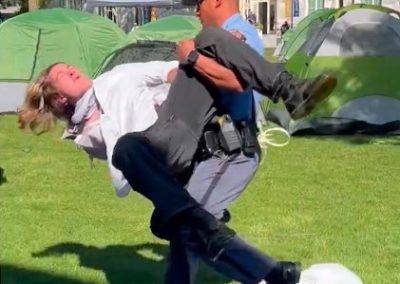The term “preventable” can be a hard word to stomach—especially when you were just involved in a traffic collision that may have been your fault. It might imply that you should have known better and you did something wrong or failed to take an action that would have avoided the collision. Not an easy thing to accept when you’re a cop.
As a cop, you are given the public’s trust. You have a tremendous amount of pride in accepting that trust and the last thing you want to do is betray that trust. But that’s exactly what’s implied if someone tells you that your collision was preventable.
Preventability
Consider this. An officer is approaching a four-way, signal-controlled intersection, with a clear view in all directions. The light turns green and the officer proceeds. An errant driver fails to stop for the red light and the patrol car broadsides the errant vehicle.
The collision is clearly not the officer’s fault because the other driver failed to stop for the red light. But as the commander, it’s your responsibility to call the collision preventable. It may not be a popular call, but it’s the right call. The officer should have seen the errant vehicle approaching and avoided the collision.
In 1985, I was pacing a 70-mph speeder in a 55-mph zone on the southbound I-110 Harbor Freeway. The speeder was in the left lane and I was using right lanes to pace them. I entered a one-lane collector road that ran along the side of the main portion of the freeway for a few hundred yards. I continued my pace and saw a vehicle enter the collector road from the right shoulder ahead of me. I began braking, then realized the vehicle had come to a stop in the single lane. I steered onto the right shoulder, but my patrol car side-swiped the car before coming to a stop. Luckily, no one was physically injured, though the speeder did get away.
When my sergeant came out to investigate the collision, he told me that this was going to be a preventable collision. I felt horrible. That word stung—not only had I betrayed the public trust and my department by damaging a patrol car and a citizen’s vehicle, but my department determined I could have done something to prevent it.
It turned out, the citizen had been on the right shoulder because his car had died. He got it started and tried to go, but it died again as he entered the lane. That didn’t matter. I had struck a stopped vehicle. How could it be anything other than my fault?
Additionally, I could have prevented the collision not placing myself in that situation, specifically, by not attempting to pace a speeder from a one-lane collector road. That decision left me with little or no options when someone pulled out in front of me. Had I stayed on the main portion of the freeway, where there were multiple lanes, I would have had more options when something unexpected happened.
By labeling the collision preventable, it had a several effects. First and foremost, it made me never want to be involved in a collision again. When I met, one-on-one with my captain, for the first time in my career, I knew I was never going to put myself in a position where I had to have a conversation like that again. While talking to my captain, he asked me to describe what happened and what I thought about what happened. He walked me through the decisions I made that day and pointed out other options I could have chosen that would have probably lead to a much different outcome. By doing this, he was imparting his wisdom, gained through his own experience, or the experience of others, and he guided me to making better decisions on my own. He was teaching me to use better judgement.
Probably the biggest lesson I learned was about making decisions that limit options. By entering that one-lane collector road, I limited my ability to maneuver if something went wrong. I gave up my “out.” It’s an important lesson that cuts through many aspects of life, both on and off the job.
In 1985, another common practice when one was involved in a preventable collision was to share the details of the collision with shift briefings. I had to draw a diagram on the board and present the sequence of events that led to the collision. By discussing the details of the collision, others got the benefit of the lessons I learned, without having to suffer the consequences.
In today’s world, this may sound like I was being punished for what was a minor traffic collision. Although the actions taken by my supervisor and commander were intended to be corrective actions, the larger effect, and benefit, was to teach good judgement. We all learned from my mistake.
Conclusion
It’s not necessarily easy to assign preventability to a collision. Nor is it easy to accept that you could have prevented a collision that may not have been your fault. But when looking at the big picture, assigning preventability to a collision, where appropriate, has the effect of changing behavior. The long-lasting benefit of imparting good judgement, and creating the environment to disseminate it amongst the troops, will surely outlast the temporary sting of the preventable label.










0 Comments